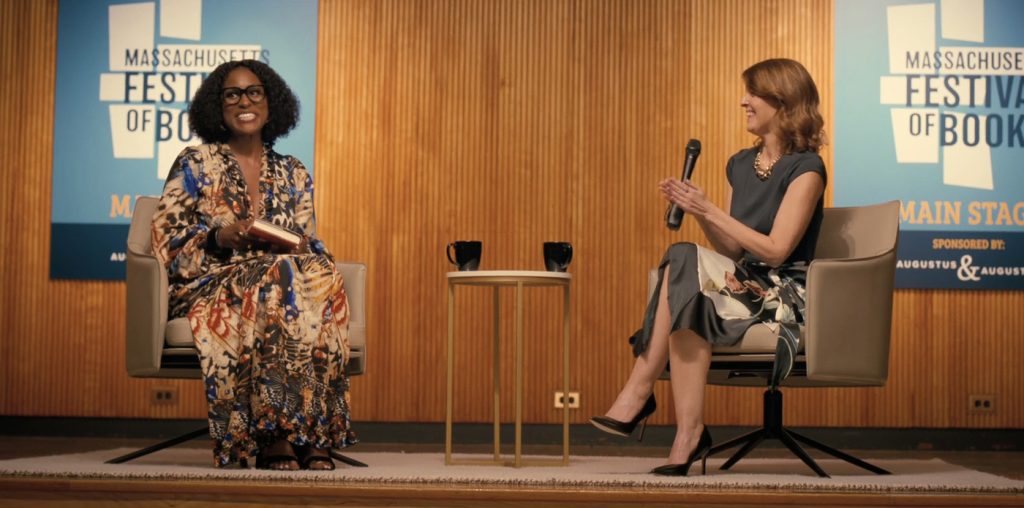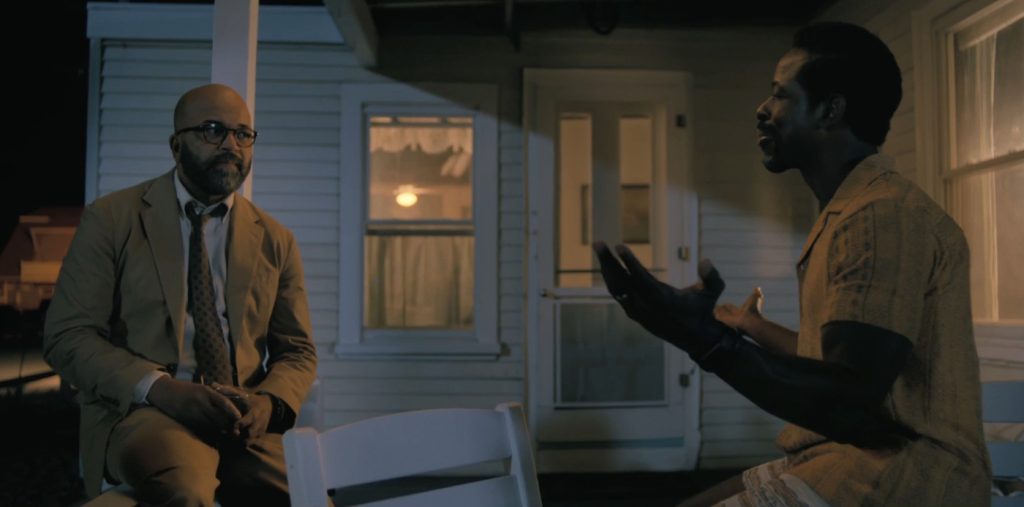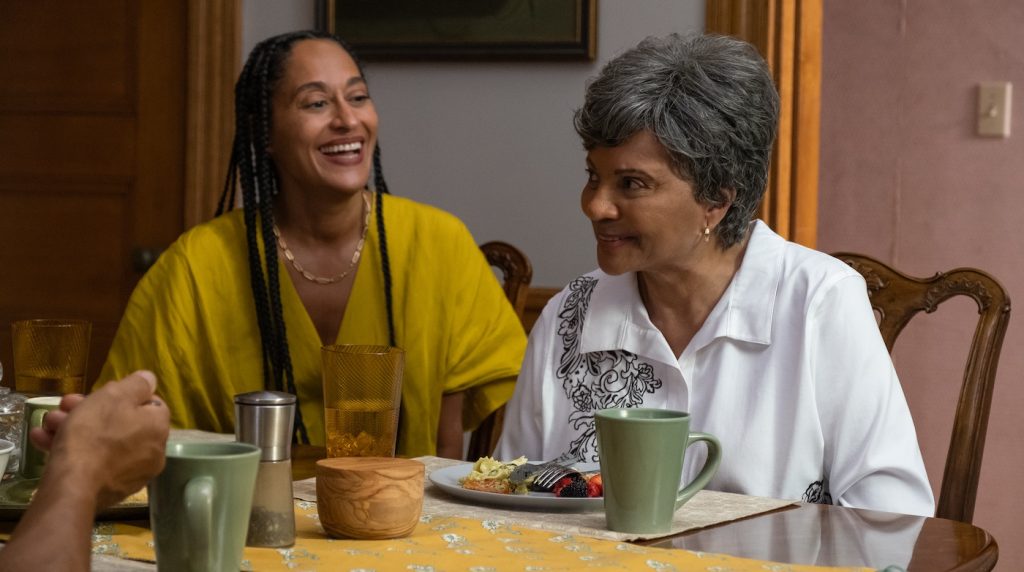“American Fiction” Writer/Director Cord Jefferson on Cutting to the Heart of the Matter
Writer/director Cord Jefferson’s narrative feature debut, American Fiction, has become one of the most talked about films this awards season, and for good reason. Adapted from Percival Everett’s 2001 novel “Erasure,” the satirical drama won the audience award upon its debut at the Toronto Film Festival, with a number of subsequent fests following suit, and was recently named one of the top ten films of 2023 by the AFI. The film follows Monk Ellison (a superb Jeffrey Wright), a Black professor and novelist fed up with the literary establishment’s take on the Black experience. He channels his frustration by writing a novel under a pseudonym that pushes outrageous racial stereotypes, only to have it published and celebrated as a great work of literature.
Wright brings Monk to life in all his complexities, and his work is a joy to watch, but the film is as much about family, friendship, and acceptance as it is about Blackness in art and culture, and those around him are crucial to his story arc. Monk has complicated relationships with his mother Agnes, played by Leslie Uggams, his newly out gay brother Cliff (Sterling K Brown), and his sister Lisa (Tracee Ellis Ross), an overworked doctor. His interactions with colleagues, too, are contentious. His agent, Arthur (John Ortiz), wants to see him succeed without leaving all the money on the table. Monk silently judges Sintara Golden (Issa Rae) for her wildly successful novel that takes place in the ghetto and is written in African-American Vernacular English. The film benefits from the ensemble cast as much as it does from Wright’s exceptional performance.
The Credits spoke to Cord Jefferson about American Fiction just after it won the Audience Award at the Middleburg Film Festival. He recalls the challenges of getting it to the screen, making some of the film’s most memorable scenes, and the importance of a diversity of voices in art that becomes part of popular conversation.
The film is based on “Erasure,” which was released in 2001, but in some ways, the issues are even more relevant now. How did the book call to you?
I worked as a journalist for about eight years before I started working in film and television, and towards the end of my career, I started getting a lot of requests to write about Trayvon Martin or Michael Brown being killed or some racist thing that somebody said, as if this was the only thing I had to offer. So when I got into film and television, I was excited because I thought finally I had no restrictions. I could write about space aliens or unicorns and not be bound by the realities of the world. Then, people would come to me asking me to write about this slave or that crack dealer or gang member. I still felt bound to this very specific, limited viewpoint of what life looks like. When I came across this book in December 2020, these were ideas that had been swirling around in my head for decades. People always talk about feeling seen or having something that speaks directly to them, and when I read this novel, it honestly felt like somebody had sat down and written Cord Jefferson a book, so I immediately leaped at the opportunity to try to adapt the script and direct the film. This was the first thing ever in my career that I wrote just on spec because I felt so passionately about the project.

This film asks lots of big questions, but one that Monk struggles with is “What is art, and who gets to make it?”
The scene that gets most at what you’re talking about is the scene towards the end where Sintara meets Monk, and they have a conversation about their ideology when it comes to their artistic process. The reason I really love that is because when I was reading the novel, I was very excited for the scene in which Monk was going meet this author he’s reviled for so long, and it never came. That scene is not in the book. When I sat down to adapt the screenplay, I knew that was one of the scenes I really wanted to put in there. What I love about that conversation is that there is no right or wrong answer. I wrote the scene, and I still don’t know who I agree with more. I think human beings have a problem with this, but Americans especially have a problem with this, that the answer to these questions sometimes is there is no answer. There is no right or wrong, and that can be frustrating. People want to see the world as being binary, black and white, right or wrong, or good and bad, but there is no answer to “what is art” or what the best way is to approach art.

Or what’s acceptable or not acceptable to create.
There’s another question to ask. Artists tend to direct their anger at other artists when they feel like they’re making art they don’t like or that has bad politics, or is doing a disservice to a group of people. Why not direct that ire at the people in control of what is being seen? Why are the people atop these systems in which these people are operating making the decisions? Artists on the ground are just working within institutions and systems created far before they ever got into making art. Why are the people atop these corporations and institutions and systems greenlighting only the things they’re interested in? They’re the ones who have their hands on the purse strings. People creating within that system are just trying to be heard and show another perspective while getting some of that money. Creative life and artistic life is a hard life. With so much distraction, now more than ever, it’s difficult to make your way, get your work out, feed yourself, and have your voice heard as an artist. Far be it for me to criticize another artist for doing what they need to do to have their voice heard.
For artists, art is hard enough to create without bringing the gatekeepers into the equation.
Right. So the question is, why are the people we are working so hard to impress so specifically interested in a very, very narrow, limited perspective on people’s lives? This movie follows a Black man, but I have Mexican friends who ask why every story coming out of Mexico has to be about drug cartels or somebody fleeing their miserable circumstances in order to reach the promised land that is the United States of America. And why is there always a weird orange-y brown wash on every shot that’s in Mexico? There are a lot of people who just feel let down that the breadth and depth of their life is not being represented in the media they consume.
One of the most beautiful aspects of the film is the arc with brothers Cliff and Monk, and Sterling and Jeffrey are great at bringing that to life.
To me, those two finding their way back together is a beautiful and important love story. I knew that just in the casting, Jeffrey was going to play Monk. He’s very prickly, he’s antagonistic and pugnacious, and he fights with his students, his colleagues, his family, and his romantic partners. Casting Sterling, who is charming, has the most natural effervescence in the world, and is just a bundle of joy as soon as you see him, I knew that it was going to be a perfect foil for Jeffrey. What you want out of that is you want Monk to melt in front of some people.

Monk does that with his sister Lisa, too.
Exactly. That’s why it was important to cast Tracee Ellis Ross, too, who is also just incredibly buoyant. The idea was to cast these people who felt like they could elicit smiles and laughter out of Monk, this character who doesn’t laugh or smile easily. In fact, he doesn’t want to do those things because, to him, it means he’s dropping the guard he’s built up around himself. I have two older siblings, and despite the ups and downs in our relationship, they still know me better than practically anybody on earth. So even in the worst of times, they know how to elicit a laugh or smile from me because we have this deep relationship. I think seeing Monk, who is so quick to alienate himself, be around these people who know his weak spots and vulnerabilities because they’ve seen him for decades now was, to me, incredibly important. Having Cliff and Monk as the oil and water, butting heads, who nonetheless find their way back to each other, that was the beautiful love story in American Fiction.

American Fiction is in theaters now.
For more recent interviews, check out these stories:
How “The Color Purple” DP Dan Laustsen Made Visual Music
“The Color Purple” Costume Designer Francine Jamison-Tanchuck’s Stunning Creations
Featured image: Erika Alexander stars as Coraline and Jeffrey Wright as Thelonious “Monk” Ellison in writer/director Cord Jefferson’s AMERICAN FICTION. An Orion Pictures Release. Photo credit: Claire Folger. © 2023 Orion Releasing LLC. All Rights Reserved.




